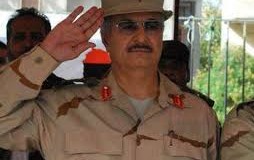There are legitimate reasons to compare the ongoing military insurrection in Libya against the Islamist-dominated government in Tripoli and the Al Qaeda/Muslim Brotherhood militias dominating the eastern half of the country to the June-July 2013 events in Egypt, which ousted the Muslim Brotherhood government of Mohamed Morsi. Libyan General Khalifa Heftar’s self-proclaimed Supreme Council of the Armed Forces is clearly modeled on the Egyptian SCAF. In the first weeks of his military actions, Heftar has won the support of some leading Libyan military commands, factions within the Interior Ministry and the largest non-Islamist political bloc, the National Forces Alliance.
U.S. Pentagon analysts emphasize that General Heftar is a long way from consolidating power. Many of the key military bases in the east of the country are still controlled by Islamist militias. In Libya, these analysts emphasize, there is no clear line of distinction between the Al Qaeda linked militias, like Ansar al-Sharia, and the Muslim Brotherhood. “They are a single zebra force,” one specialist commented to MEB.
Nevertheless, General Heftar is enjoying strong covert support from three vital quarters: The Egyptian military is providing weapons and training to General Heftar’s forces, which started their “Operation Karama” (“Operation Dignity”) preparations from the eastern Libyan town of Bayda. The fourth largest city in the country, Bayda is on the Mediterranean coast near the Egyptian border. Heftar is also receiving backing from the United Arab Emirates and from Saudi Arabia, two of the Gulf states that have declared open war against the Muslim Brotherhood, and who have been supporting General Abdel-Fattah Al-Sissi in his ouster of the Morsi government and his campaign for the Egyptian presidency.
While the Obama Administration has claimed that it is “following with interest” the events unfolding in Libya, it has officially denied providing any support to General Heftar and his nascent rebellion. Other American sources have told MEB that the United States is, in fact, providing some critical intelligence support, hoping that his efforts will gain sufficient support to give the U.S. an opportunity to correct some of the intelligence and policy mistakes made during the campaign to overthrow Qaddafi and its aftermath.
American oil multinationals and other Western business interests who have stayed out of Libya as the result of the dominance of the Islamist factions following the overthrow of Qaddafi, are looking to General Heftar’s campaign as the best opportunity yet to accomplish two crucial objectives: keep the country intact as a single nation-state, and crush the Al Qaeda and allied forces who have dominated the post-Qaddafi landscape.
That is a tall order, and in many obvious respects, Libya is not like Egypt, with its long history and institutional foundation.
General Khalifa Heftar is a known quantity. He spent 20 years living in exile in the United States after the U.S. helped negotiate his release from Kenyan authorities following a failed expedition into Chad in the mid-1980s on behalf of Qaddafi. Gen. Heftar returned to Libya in 2011 and held senior posts in the rebel military operations. He has retained close ties to American government circles from the recent past. One such contact is Mary Beth Long, who was Assistant Secretary of Defense under Donald Rumsfeld and Robert Gates during the George W. Bush Administration. Long served as a counter-terrorism liaison to Saudi Arabia, led the Defense Department’s training of Afghan police and now runs a private consulting firm, that has contracts with the Pentagon, the Defense Intelligence Agency, the Department of Homeland Security, the U.S. Joint Forces Command and NATO.
 Geostrategic Media Political Commentary, Analysis, Security, Defense
Geostrategic Media Political Commentary, Analysis, Security, Defense





